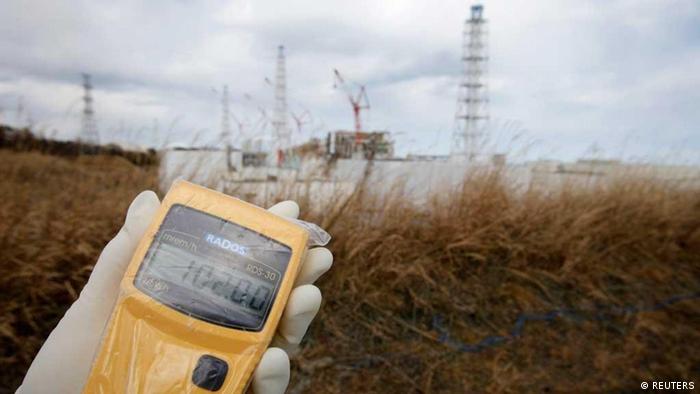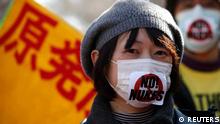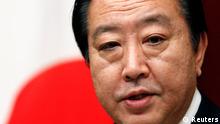
Japan is now down to one nuclear reactor to supply electricity
to its troubled power sector after the Tokyo Electric Power Co. on
Monday took its last remaining reactor off line for regular maintenance.
The No. 6 reactor at the Kashiwazaki-Kariwa complex, the world's
biggest nuclear power plant, has been shut down for maintenance by the
Tokyo Electric Power Co. (Tepco), the operator of the Fukushima plant
that suffered meltdowns, explosions and radiation leaks after the March
11, 2011, earthquake and tsunami.
The shutdown leaves only one of Japan's 54 commercial nuclear reactors online after last year's devastating earthquake and tsunami.
That reactor, a unit at Hokkaido Electric Power Co.'s plant on Hokkaido in northern Japan, is also expected to be shut down in early May for scheduled maintenance work.
Possible power shortages
 Opposition to nuclear energy remains high
Japanese reactors are taken off line every 13 months for regular
checks. However, with concerns over nuclear safety running high
following the Fukushima crisis, none of the reactors that have been shut
down for checks or were already offline at the time of the disaster
have been allowed to restart.
Opposition to nuclear energy remains high
Japanese reactors are taken off line every 13 months for regular
checks. However, with concerns over nuclear safety running high
following the Fukushima crisis, none of the reactors that have been shut
down for checks or were already offline at the time of the disaster
have been allowed to restart.
The nuclear reactor shutdowns in Japan raise the possibility of power shortages across the nation as demand increases in the hot summer months.
Tepco president Toshio Nishizawa said the company was "closely studying the summer power supply situation" and currently saw no problem. Others, however, are less sure.
Of the 17 reactors owned by Tepco, which provides electricity to some 45 million people in the Tokyo area, all six at its devastated Fukushima Daiichi plant are offline, as well as four at its neighboring Fukushima Daini plant.
At its Kashiwazaki Kariwa plant, three remain offline after a magnitude 6.8 earthquake struck the area in July 2007 and small fires followed. Four others are under maintenance.
Before the crisis, Japan depended on nuclear power for one-third of its electricity. The government hopes to restart reactors as soon as "stress tests" prove they are safe.
The stress tests, similar to those used in France and elsewhere in Europe, are designed to assess how well the plants can withstand earthquakes, tsunamis, storms, loss of power and other crises.
Strong opposition to nuclear power
 Japan Prime Minister Yoshihiko Noda aims to reduce Japan's reliance on nuclear power
The timing for when any reactors will be restarted remains unclear, however.
Japan Prime Minister Yoshihiko Noda aims to reduce Japan's reliance on nuclear power
The timing for when any reactors will be restarted remains unclear, however.
Japan's government continues to face strong opposition to nuclear power. Local leaders, fearing a political backlash, are reluctant to give their approval.
Greenpeace Japan's executive director Junichi Sata said the country could survive without rushing to restart its nuclear sector. "Japan is practically nuclear free, and the impact on daily life is invisible," he said in a statement.
Prime Minister Yoshihiko Noda has promised to reduce Japan's reliance on nuclear power over time and plans to lay out a new energy policy by summer.
Meanwhile, Japan has temporarily turned to oil and coal generation plants to make up for the shortfall, and has called for power conservation.
Author: John Blau (Reuters, AP, AFP)
Editor: Shamil Shams
The shutdown leaves only one of Japan's 54 commercial nuclear reactors online after last year's devastating earthquake and tsunami.
That reactor, a unit at Hokkaido Electric Power Co.'s plant on Hokkaido in northern Japan, is also expected to be shut down in early May for scheduled maintenance work.
Possible power shortages
 Opposition to nuclear energy remains high
Opposition to nuclear energy remains highThe nuclear reactor shutdowns in Japan raise the possibility of power shortages across the nation as demand increases in the hot summer months.
Tepco president Toshio Nishizawa said the company was "closely studying the summer power supply situation" and currently saw no problem. Others, however, are less sure.
Of the 17 reactors owned by Tepco, which provides electricity to some 45 million people in the Tokyo area, all six at its devastated Fukushima Daiichi plant are offline, as well as four at its neighboring Fukushima Daini plant.
At its Kashiwazaki Kariwa plant, three remain offline after a magnitude 6.8 earthquake struck the area in July 2007 and small fires followed. Four others are under maintenance.
Before the crisis, Japan depended on nuclear power for one-third of its electricity. The government hopes to restart reactors as soon as "stress tests" prove they are safe.
The stress tests, similar to those used in France and elsewhere in Europe, are designed to assess how well the plants can withstand earthquakes, tsunamis, storms, loss of power and other crises.
Strong opposition to nuclear power
 Japan Prime Minister Yoshihiko Noda aims to reduce Japan's reliance on nuclear power
Japan Prime Minister Yoshihiko Noda aims to reduce Japan's reliance on nuclear powerJapan's government continues to face strong opposition to nuclear power. Local leaders, fearing a political backlash, are reluctant to give their approval.
Greenpeace Japan's executive director Junichi Sata said the country could survive without rushing to restart its nuclear sector. "Japan is practically nuclear free, and the impact on daily life is invisible," he said in a statement.
Prime Minister Yoshihiko Noda has promised to reduce Japan's reliance on nuclear power over time and plans to lay out a new energy policy by summer.
Meanwhile, Japan has temporarily turned to oil and coal generation plants to make up for the shortfall, and has called for power conservation.
Author: John Blau (Reuters, AP, AFP)
Editor: Shamil Shams
| Japan reactor has fatally high radiation, no water BusinessWeek By MARI YAMAGUCHI One of Japan's crippled nuclear reactors still has fatally high radiation levels and hardly any water to cool it, according to an internal examination Tuesday that renews doubts about the plant's stability. A tool equipped with a tiny ... |
| Japan has lots of plutonium on hand, little way to use it Washington Post SEOUL — The plutonium Japan has stockpiled for decades was supposed to be a smart energy source for the resource-poor nation. But last year's earthquake-triggered nuclear accident, along with growing global anxiety about extremists gaining access to ... |
沒有留言:
張貼留言